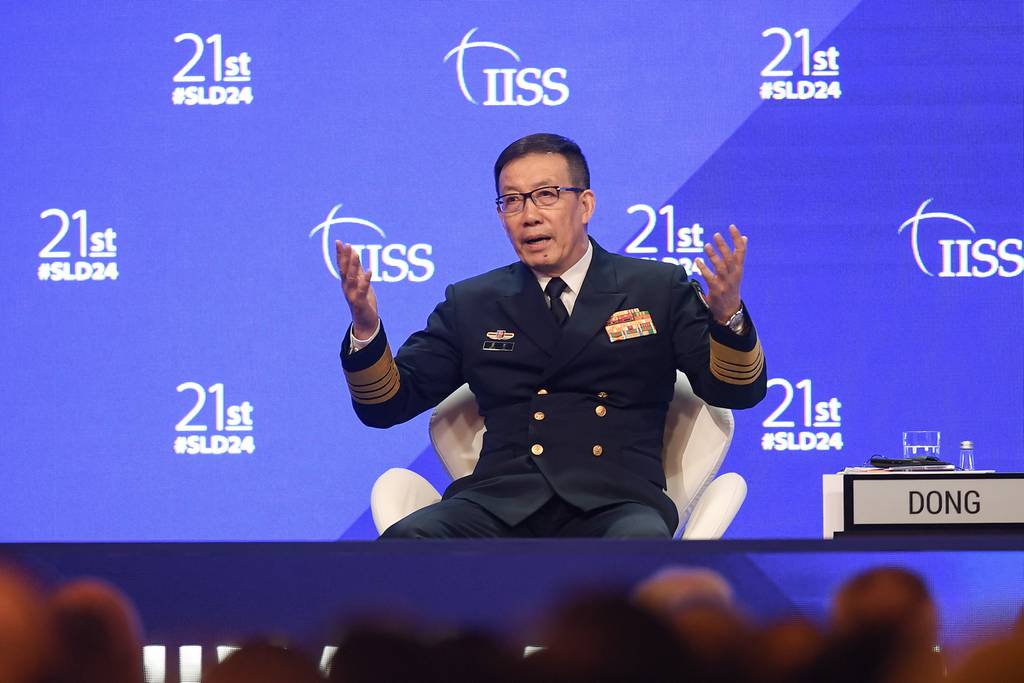
SINGAPORE — After meeting with U.S. Defense Secretary Lloyd Austin for the first time, China’s new defense minister paused in an outdoor hallway to wipe the fog off his glasses.
Standing near the press, Adm. Dong Jun smiled. And to a member of the American delegation, he described the best place in China, in his opinion, to go see pandas. It was diplomacy in action.
Two days later, Dong had a different tone.
He gave a stern, at times strident, speech on the last day of the Shangri-La Dialogue, a defense summit in Singapore that draws officials from across the region. Dong warned that those who support independence for Taiwan — a rogue province in the eyes of China’s leaders — will face “self-destruction.”
At another point, he said that the odds of “peaceful reunification” with the island nation are “eroding.”
These two points in time were representative of China’s goals for the summit — and by extension the reputation it may be seeking in the region. It appears China came to reassure other countries it is acting responsibly; after all, it did resume top military talks with the U.S..
But at the same time, it sent a message of enforcement — specifically regarding its interests in Taiwan and the South China Sea. After facing criticism from regional neighbors during the summit, Dong’s speech showed China’s hardened position on sensitive topics.
“That was the most consistently intimidating speech we’ve heard from China at a Shangri-La Dialogue,” Rory Medcalf, head of the National Security College at Australian National University, wrote on X.
‘Greater scrutiny’
A U.S. official agreed with the post, calling the speech “tone deaf.”
“Countries across the region and around the world continue to have serious concerns about coercive [Chinese] activities in the East and South China seas, in the Taiwan Strait, and beyond,” the official said on the condition of anonymity, due to the sensitivity of the topic.
The reference was to China’s military activities around the Second Thomas Shoal, a reef in the South China Sea on which the Philippines has an outpost. China and the Philippines are among several nations asserting sovereignty over local geographic features.
Chinese Coast Guard vessels have spent months harassing Philippine vessels during resupply missions — at times firing water cannons and disabling ships.
Two days before Dong spoke, Philippines President Ferdinand Marcos Jr. warned he would consider the death of any Filipino due to such behavior an act of war. That decision could pull the U.S., which has a mutual defense treaty with Manila, into a conflict.
But Marcos wasn’t the only speaker with harsh words for China at the conference. Austin repeated Pentagon talking points that conflict isn’t “imminent or unavoidable.”
And Australia’s defense minister, Richard Marles, said: “As China steps up to a larger role, it must accept, like all great powers, that there will be much greater scrutiny on the way it uses its strength.”
Two years ago, after then-House Speaker Nancy Pelosi, D-Calif., visited Taiwan, China ended military talks with the U.S. The break worried some attending last year’s Shangri-La Dialogue, when China’s defense minister at the time had declined an offer to meet with American defense officials.
Those talks restarted after a summit with U.S. President Joe Biden and Chinese leader Xi Jinping in November, and Dong spoke at length about the value of communication during his remarks.
“The Chinese military never acts from the position of strength in his relations with foreign militaries,” Dong said. “At the same time, others should not expect to impose their will on us.”
Words and actions
But as one audience member pointed out to Dong during a Q&A session, those signals often don’t match China’s actions.
The week before the conference, China launched a series of military drills around Taiwan, responding to a speech from the island nation’s new president, who some in Beijing view as a pro-independence official. China labeled these exercises a “punishment.”
In his speech, Dong cited “external interfering forces,” a euphemism for the U.S. and other allied countries, for tension in the South China Sea and Taiwan.
After his speech, the minister wouldn’t address questions about China’s role in the Russia-Ukraine war nor the Israel-Hamas war in the Gaza Strip. He did, however, speak for more than 10 minutes straight about those he claimed are seeking Taiwanese independence “incrementally.”
“They keep testing China’s red lines,” he said, referencing arms sales and “official engagements,” likely a reference to the members of Congress who recently visited the island.
When the moderator at the conference took several critical questions from the crowd, Dong tried a quick joke.
“I can feel the charm of the Shangri-La Dialogue,” he said.
Noah Robertson is the Pentagon reporter at Defense News. He previously covered national security for the Christian Science Monitor. He holds a bachelor’s degree in English and government from the College of William & Mary in his hometown of Williamsburg, Virginia.
- SEO Powered Content & PR Distribution. Get Amplified Today.
- PlatoData.Network Vertical Generative Ai. Empower Yourself. Access Here.
- PlatoAiStream. Web3 Intelligence. Knowledge Amplified. Access Here.
- PlatoESG. Carbon, CleanTech, Energy, Environment, Solar, Waste Management. Access Here.
- PlatoHealth. Biotech and Clinical Trials Intelligence. Access Here.
- Source: https://www.defensenews.com/global/asia-pacific/2024/06/02/chinese-defense-head-warns-of-self-destruction-for-taiwan-supporters/



